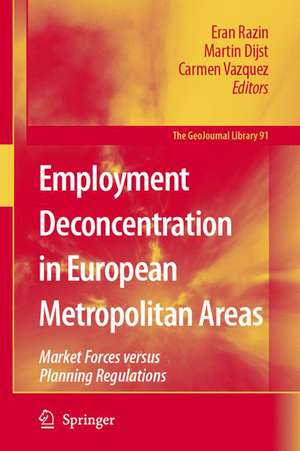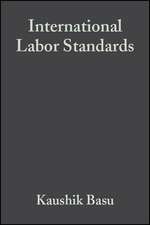Employment Deconcentration in European Metropolitan Areas: Market Forces versus Planning Regulations: GeoJournal Library, cartea 91
Editat de Eran Razin, Martin Dijst, Carmen Vázquezen Limba Engleză Hardback – 15 iun 2007
| Toate formatele și edițiile | Preț | Express |
|---|---|---|
| Paperback (1) | 945.62 lei 43-57 zile | |
| SPRINGER NETHERLANDS – 23 noi 2010 | 945.62 lei 43-57 zile | |
| Hardback (1) | 951.77 lei 43-57 zile | |
| SPRINGER NETHERLANDS – 15 iun 2007 | 951.77 lei 43-57 zile |
Din seria GeoJournal Library
- 15%
 Preț: 642.51 lei
Preț: 642.51 lei - 15%
 Preț: 632.70 lei
Preț: 632.70 lei -
 Preț: 396.78 lei
Preț: 396.78 lei - 18%
 Preț: 948.92 lei
Preț: 948.92 lei -
 Preț: 430.59 lei
Preț: 430.59 lei - 18%
 Preț: 899.69 lei
Preț: 899.69 lei - 15%
 Preț: 581.79 lei
Preț: 581.79 lei - 18%
 Preț: 938.34 lei
Preț: 938.34 lei - 18%
 Preț: 888.80 lei
Preț: 888.80 lei - 15%
 Preț: 703.85 lei
Preț: 703.85 lei - 18%
 Preț: 890.68 lei
Preț: 890.68 lei - 24%
 Preț: 777.63 lei
Preț: 777.63 lei -
 Preț: 400.65 lei
Preț: 400.65 lei - 18%
 Preț: 785.55 lei
Preț: 785.55 lei - 18%
 Preț: 946.55 lei
Preț: 946.55 lei - 15%
 Preț: 661.02 lei
Preț: 661.02 lei - 18%
 Preț: 945.79 lei
Preț: 945.79 lei - 15%
 Preț: 637.28 lei
Preț: 637.28 lei - 15%
 Preț: 637.59 lei
Preț: 637.59 lei - 15%
 Preț: 637.46 lei
Preț: 637.46 lei - 15%
 Preț: 635.31 lei
Preț: 635.31 lei - 20%
 Preț: 568.43 lei
Preț: 568.43 lei - 15%
 Preț: 645.79 lei
Preț: 645.79 lei - 20%
 Preț: 569.85 lei
Preț: 569.85 lei - 15%
 Preț: 651.99 lei
Preț: 651.99 lei - 15%
 Preț: 639.41 lei
Preț: 639.41 lei - 15%
 Preț: 643.48 lei
Preț: 643.48 lei - 15%
 Preț: 663.60 lei
Preț: 663.60 lei - 15%
 Preț: 651.99 lei
Preț: 651.99 lei - 15%
 Preț: 651.02 lei
Preț: 651.02 lei -
 Preț: 390.63 lei
Preț: 390.63 lei -
 Preț: 395.63 lei
Preț: 395.63 lei
Preț: 951.77 lei
Preț vechi: 1160.70 lei
-18% Nou
Puncte Express: 1428
Preț estimativ în valută:
182.12€ • 190.66$ • 150.69£
182.12€ • 190.66$ • 150.69£
Carte tipărită la comandă
Livrare economică 07-21 aprilie
Preluare comenzi: 021 569.72.76
Specificații
ISBN-13: 9781402057618
ISBN-10: 140205761X
Pagini: 320
Ilustrații: XVI, 304 p.
Dimensiuni: 155 x 235 x 19 mm
Greutate: 0.63 kg
Ediția:2007
Editura: SPRINGER NETHERLANDS
Colecția Springer
Seria GeoJournal Library
Locul publicării:Dordrecht, Netherlands
ISBN-10: 140205761X
Pagini: 320
Ilustrații: XVI, 304 p.
Dimensiuni: 155 x 235 x 19 mm
Greutate: 0.63 kg
Ediția:2007
Editura: SPRINGER NETHERLANDS
Colecția Springer
Seria GeoJournal Library
Locul publicării:Dordrecht, Netherlands
Public țintă
Popular/generalCuprins
Introduction: Deconcentration of economic activities within metropolitan regions: A qualitative framework for cross-national comparison.- Economic deconcentration in a rational planning system: The Dutch case.- Deconcentration of workplaces in greater Copenhagen: Successes and failures of location strategies in regional planning.- Economic deconcentration processes in mid-sized English cities: Deconcentrated outcomes and spatially differentiated impacts.- The Spanish way to economic deconcentration: A process of several speeds.- The Italian way to deconcentration. Rome: The appeal of the historic centre. Chieti-Pescara: The strength of the periphery.- Deconcentration in a context of population growth and ideological change: The Tel-Aviv and Beer-Sheva metropolitan areas.- Sprawling post-communist metropolis: Commercial and residential suburbanization in Prague and Brno, the Czech Republic.- The impact of retail deconcentration on travel to hypermarkets in Prague.- Employment deconcentration in European metropolitan areas: A comprehensive comparison and policy implications.
Textul de pe ultima copertă
Spatial deconcentration of economic activities, particularly the growth of suburban office, retail and entertainment concentrations, has become a prime concern in European metropolitan areas. This book provides a cross-national comparative perspective on employment deconcentration within selected metropolitan areas in Europe. Whereas most debate over urban sprawl and deconcentration is oriented towards the North American context, this book aims at a better understanding of this phenomenon in the European context, emphasizing the location of economic activities rather than residential patterns. It provides insights on whether different governance attributes produce particular forms of deconcentration versus the influence of market attributes and local specificities, also commenting on quality of life impacts and possible governance and policy implications of the deconcentration process.
Introduction of a comparative framework is followed by eight case study chapters, three representing northern Europe, three the southern European-Mediterranean region and two post-communist central Europe. Most chapters examine two metropolitan areas, usually a large one and a smaller one. The comparison reveals considerable variations in the magnitude, form, and process of employment deconcentration, only partly in line with expected influences of governance systems. Evidence does not fully confirm an anticipated distinction between Northern and Mediterranean Europe; the Czech Republic and Israel seem to diverge most from prevailing European trends.
Introduction of a comparative framework is followed by eight case study chapters, three representing northern Europe, three the southern European-Mediterranean region and two post-communist central Europe. Most chapters examine two metropolitan areas, usually a large one and a smaller one. The comparison reveals considerable variations in the magnitude, form, and process of employment deconcentration, only partly in line with expected influences of governance systems. Evidence does not fully confirm an anticipated distinction between Northern and Mediterranean Europe; the Czech Republic and Israel seem to diverge most from prevailing European trends.
Caracteristici
Adds a unique feature to the voluminous literature on urban sprawl: the focus on economic activities Focus on European metropolitan areas (and on economic activities within European metropolitan areas) Unique comparative perspective on employment deconcentration that includes also transformed post-communist and Israeli metropolitan areas Contribution to the literature on urban outcomes of transformed welfare state regimes Detailed accounts on spatial processes in selected major European metropolitan areas












